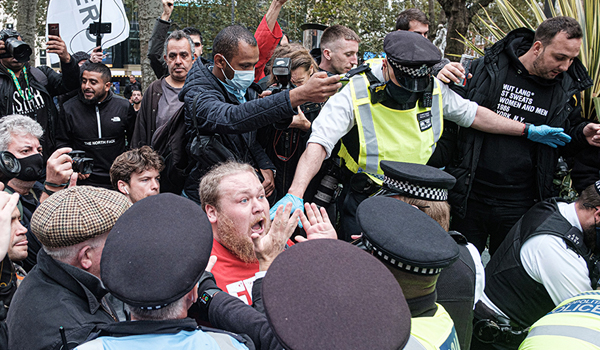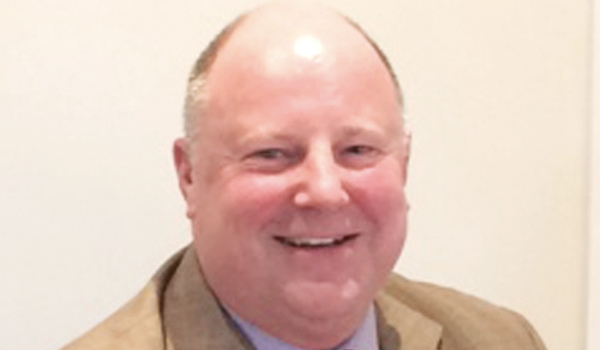Epidemic of hate
Religious hate crimes in England and Wales are at a record high – but many still go unreported, explains Professor Peter Hopkins.
Religious hate crimes in England and Wales are at record levels. New Home Office statistics reveal that although hate crime overall saw an annual decrease of five per cent in the year to March 2024, there was a 25 per cent increase in religious hate crimes.
Hate crimes against Jewish people more than doubled from the previous year, making up 33 per cent of religion-based hate crime in the new figures. Those against Muslims rose by 13 per cent, making up 38 per cent of the total.
There was a sharp increase in reported incidents against both Jewish and Muslim people after the Israel-Hamas conflict began in October 2023. While the total number of offences has since declined, it is still higher than before the conflict began.
These figures reflect police-recorded hate crime, but other organisations also track these incidents. Tell Mama, which tracks anti-Muslim hate, recorded a 335 per cent increase in cases in the months after October 7 2023 compared to the year before. And the Community Security Trust tracked a 147 per cent rise in anti-Jewish hate in 2023 compared with 2022. Of these incidents, 66 per cent were on or after October 7.
The October 7 attacks are an example of a trigger event that usually precedes a spike in hate crime. These events can “galvanise tensions and sentiments against the suspected perpetrators and groups associated with them”.
Trigger events can be one-off events or last only a short period of time, but the continuing high levels of hate crime that the UK has seen over the past year is still likely due to the ongoing situation in the Middle East.
These trends had been increasing worldwide, and not only since the latest conflict. A UN report in 2021 found that Islamophobia had reached “epidemic proportions”. Additionally, as my colleagues and I have found in our research, such racism is also experienced by a diverse range of ethnic groups and not only Muslims. A rise in antisemitism has been recorded around the world too.
Unreported hate
Not only are the latest statistics in the UK alarming, they are only the tip of the iceberg. As my work on the inquiry into Islamophobia in Scotland found, many incidents go unreported.
We found that many did not report incidents due to concerns about institutional racism in the police and a lack of confidence in policing and in the criminal justice system. Added to this were worries about not having enough evidence, the incident not being “serious enough”, and fear of reprisal. Some even felt that it happened so often that there was “no point” in reporting it.
The spread of inaccurate information on social media has stirred up Islamophobia, antisemitism and racism, and led to violence against migrants
The long-term impacts of hate crime are deeply concerning. Victims who experience constant discrimination are likely to experience poor health outcomes and premature ageing.
The rising numbers also promote a culture of fear that can discourage members of ethnic or religious minority groups from participating fully in society. My colleagues and I have found in our research that Islamophobia and prejudice has stopped some Muslims from participating in politics and going out to socialise.
Encouragingly, however, others chose to become more active in their communities in order to challenge stereotypes about Muslims.
Making prejudice mainstream
In addition to the trigger event of the Israel-Hamas war, there are a number of factors that contribute to rising hate crime, particularly against Muslims.
First is the prevalence of organisations and individuals, including media outlets, online influencers, far-right think-tanks and political figures, who promote anti-Muslim messaging and hatred.
The rise of far-right politics around the world plays a role. The election of Donald Trump, as well as recent electoral gains by Marine Le Pen in France, the Freedom Party in Austria and Reform UK, show how such politics are seeping into the mainstream.
But even supposedly centrist politicians spread narratives that contribute to Islamophobia and racism. For example, former prime minister David Cameron decried the failure of multi-culturalism and this message was repeated by Suella Braverman when she was Home Secretary.
This perpetuates the idea that it is not possible for different ethnic and religious groups to live in harmony. I would argue this provides an ideal platform for the promotion of Islamophobia.
Mainstream media outlets and social media also shape the narratives that contribute to a culture of fear around Muslims. High-profile acts of religious hatred, such as the atrocities committed by Anders Breivik in Oslo in 2011 or by Brenton Tarrant in Christchurch in 2019, tend to be put down to a “lone wolf” or to be regarded as “fringe incidents”, rather than part of a wider problem to be addressed. Both Breivik and Tarrant promoted white supremacy and were explicitly anti-Muslim.
The spread of inaccurate information on social media has stirred up Islamophobia, antisemitism and racism, and led to violence against migrants. This was seen in the far-right riots in summer 2024 following the fatal stabbing of three young girls in Southport, near Liverpool.
According to a report by the Centre for Countering Digital Hate, a false name and disinformation suggesting the attacker was Muslim reached around 1.7 billion people across several platforms.
The long history of Islamophobia in Britain can be traced back to the response to the 9/11 terror attacks and the ‘War on Terror’. The UK’s counter-terrorism programme Prevent has made life intolerable for Muslims by promoting the idea that all Muslims are potential terrorists and a threat to security.
The obsession with this approach persists internationally despite the existence of several alternatives, yet it urgently needs to be replaced alongside the thinking that supports it.
The result of all this is that Islamophobia has flourished in the UK without being called out by those in power. This must be challenged if we want to see a reduction in racially and religiously motivated hate crime.
Peter Hopkins is Professor of Social Geography at Newcastle University. This article was also published on The Conversation – https://theconversation.com/religious-hate-crimes-in-england-and-wales-are-at-a-record-high-but-many-still-go-unreported-241071
Disability hate crime ‘critically under-reported’
Latest Home Office figures show disability hate crimes reduced by 18 per cent in the year to March 2024, down from 14,285 to 11,719 compared with the previous year, writes Paul Jacques.
This was the lowest figure for disability hate crimes since the year ending March 2021, when 9,945 offences were recorded.
However, according to not-for-profit support provider Dimensions, disability hate crime remains “critically under-reported” and in 2023, the number of prosecutions of disability hate crime offences “continued to slump”.
A new study by Nottingham Trent University (NTU) reveals that providing training for policing students and police employees on tackling learning disability and autism hate crime significantly improves their confidence and understanding, ultimately equipping them to better support victims.
Dimensions now plans to roll out training to help police services navigate communication with people with learning disabilities and autistic people – helping ensure victims of disability hate crime receive the justice and support they deserve.
It says the training remains “more crucial than ever”, as research it conducted in 2023 found that six per cent of UK adults admit to having physically hurt someone because of their learning disability or autism – equivalent to 3.6 million people.
Dimensions has worked with NTU to develop a face-to-face training package, which can be delivered by university lecturers alongside local self-advocates with lived experience of a learning disability.
An evaluation of the training found that it was particularly successful in raising awareness, fostering empathy and providing practical strategies to better support disabled individuals and address disability hate crimes.
The evaluation report said while most police services do currently provide hate crime training, a dedicated section to raise awareness and knowledge about disability hate crimes is necessary so that officers can better equip themselves to help a disabled person.
Dr Mark Brookes MBE, advocacy lead at Dimensions, said: “This is a very personal topic for me because I have also been a victim. It is vital that training of police officers be mandatory and completed face-to-face with people who have lived experience.
This kind of training doesn’t just provide knowledge, it fosters empathy and creates a safe environment for dialogue. We must ensure officers understand the challenges people with learning disabilities and autistic people face, and they are equipped to make adjustments that can mean the difference between a victim feeling heard or sidelined. Everyone deserves to feel safe, and it’s critical the police are seen as allies in that.”
Sarah Walters, campaigns manager at Dimensions, added: “NTU’s evaluation reinforces how vital this training is in equipping the police to tackle disability hate crimes effectively. Low reporting rates are in part due to victims feeling like the police won’t understand them. We need to change that narrative by educating the next generation of officers and paving the way for a more inclusive and supportive environment.”
NTU Associate Professor Irene Zempi and Professor Loretta Trickett stated: “Disability hate crime remains a hugely under-reported crime and official statistics are likely to reflect the tip of the iceberg.
“Disability hate crime remains a significant area for concern in terms of under-reporting because of issues around accessibility of reporting, mate crime, victims’ lack of confidence, lack of awareness, and previous negative experiences of reporting to criminal justice agencies.
“This collaboration with Dimensions is timely and sheds light on the importance of disability hate crime training being informed by lived experiences.”
Martin Tangen, course leader for MSc International Law Enforcement at NTU, said: “Hidden disability and neurodiversity are critical conditions that affect and impact upon modern policing.
“The work we have done with Dimensions in order to raise our future police officers’ awareness of these issues is crucial to those officers providing a better service to victims, witnesses and suspects who may have such a condition. By raising their awareness and giving them information about these conditions, those future officers will have a greater understanding and be able to provide a better and more considerate service to the public.”
Dimensions developed the disability hate crime training session as part of its #ImWithSam campaign, which has been running since 2013.
The partnership with NTU follows successful training with Avon and Somerset Constabulary and Dimensions making its learning disability and autism hate crime e-learning available online and free for all police colleagues to take.





